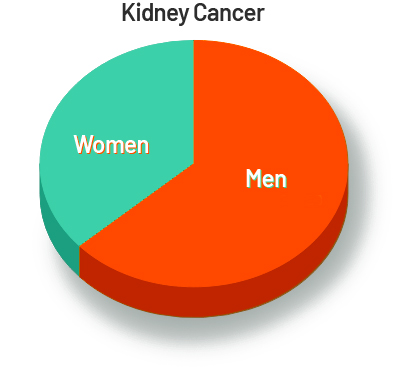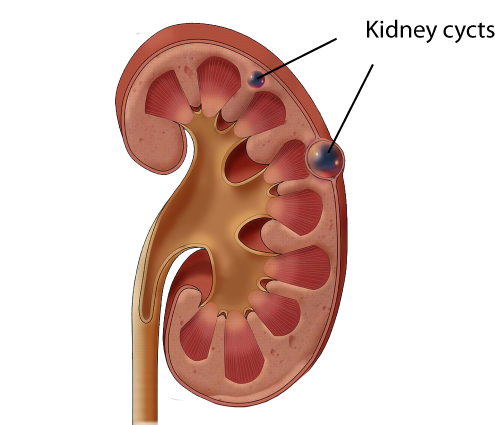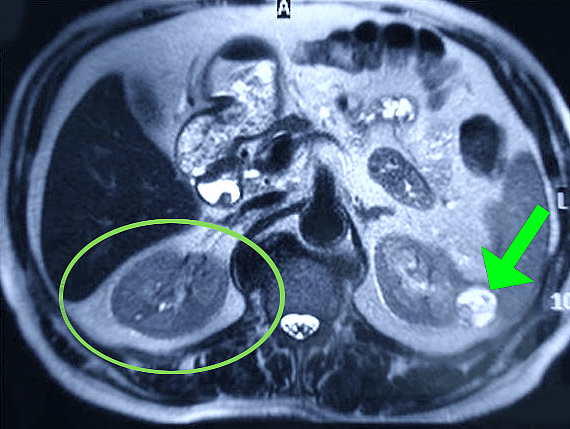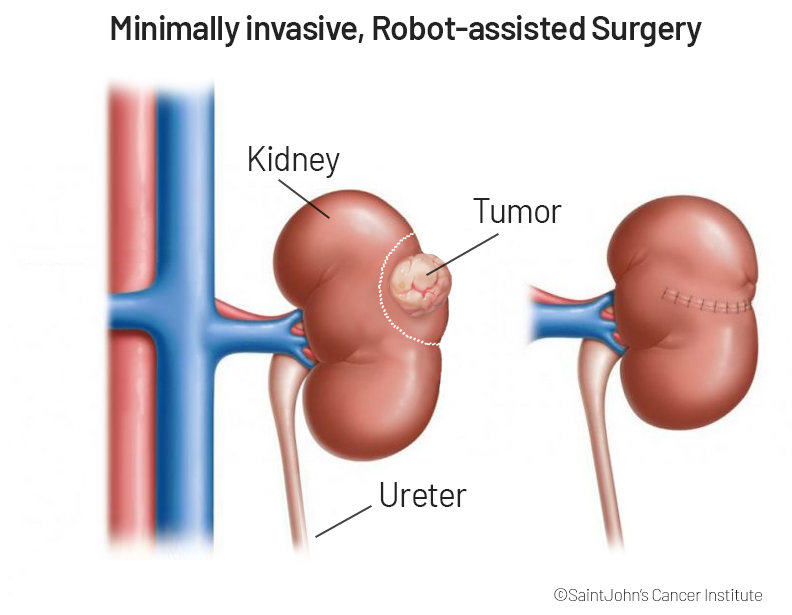
Kidney cancer is a renal disease that begins in the kidneys. The urologists of Saint John’s Cancer Institute and Health Center can effectively diagnose kidney conditions and develop personalized, effective treatment plans for kidney cancer.
About the Kidneys and Kidney Cancer
Our kidneys are the filters for our blood. They are located behind the abdominal organs, having one on each side of the spine. They not only remove waste but regulate our electrolytes. As part of the urinary tract, the main job of the kidneys is to make urine by removing waste and extra water before sending it into the bladder to be released from the body. Kidneys also help control blood pressure by producing a hormone called renin and help to make sure the body has enough red blood cells by making a hormone called erythropoietin.

What is Kidney Cancer?
In adults, renal cell carcinoma is the most common type of kidney cancer. If untreated, kidney cancer can spread to other parts of the body. Kidney cancer is also called renal cancer. It is one of the ten most common cancers in both men and women. In 2022, about 79,000 new cases of kidney cancer will be diagnosed consisting of about 50,000 men and 29,000 women, according to The American Cancer Society. About 14,000 will die from the disease, consisting of about 9,000 men and 5,000 women.
Kidney cancer cells can spread through the lymph nodes and blood vessels, crossing into the lungs, bones, or liver. When this happens, cancer has metastasized (spread to other parts of the body), and new tumors may form in those parts of the body.
What are the two most common types of kidney cancers?
Renal Cell Carcinoma:
Renal Cell Carcinoma (RCC) is the most common type of kidney cancer that originates in the lining of the small tubes in the kidney that transport urine. RCC is the most common type of kidney cancer in adults, which is responsible for approximately 90–95% of all cases. About 9 out of 10 kidney cancers are renal cell carcinomas. About 54,000 Americans are diagnosed with renal cell carcinoma each year. Most are over 55 years old.

Transitional Cell Carcinoma:
Transitional Cell Carcinoma (TCC) is a more rare form of kidney cancer. It is also referred to as urothelial carcinoma. This cancer originates in the urothelial cells that line the inside of the bladder but can affect the ureters and kidney. About 5 to 10 of every 100 cancers in the kidney are transitional cell carcinomas, being the second most common cancer that affects the kidneys.
What are kidney cysts?
A kidney cyst is different than a kidney tumor, or cancer. Kidney cysts are small pouches of fluid that form on or in the kidneys. Though kidney cysts may impair function, they are not cancerous and rarely cause problems.
It’s not clear what causes simple kidney cysts. Simple kidney cysts aren’t the same as cysts that form with polycystic kidney disease. They also differ from complex cysts, which need to be watched for changes that could be cancer.
Kidney Cancer Stages:
If you are diagnosed with kidney cancer, your doctor will determine the stage of the disease. Staging is a way of classifying cancer development by how much of the disease is present and whether it has spread to other parts of the body. This helps doctors plan the best way to treat cancer.

Stage 1:
Stage 1 kidney cancer is an early form of cancer, meaning it is confined to the kidney and has not spread to other parts of the body. This stage typically involves a small tumor, usually less than 7 cm, allowing for a range of treatment options that aim to remove or destroy cancer cells while preserving kidney function. Early detection significantly improves the success of treatment.
Common treatments for stage 1 kidney cancer include:
- Surgery: The most common approach, surgery removes either the tumor alone (partial nephrectomy) or the entire kidney (radical nephrectomy) if necessary.
- Ablation Therapy: This minimally invasive option uses extreme heat or cold to destroy cancer cells, ideal for patients who may not tolerate surgery.
- Active Surveillance: For very small, slow-growing tumors, your doctor may recommend regular monitoring instead of immediate treatment.
Stage 2:
Stage 2 kidney cancer means the tumor is larger than 7 cm but remains confined to the kidney, offering an optimistic outlook with prompt treatment. At this stage, removing the cancer before it spreads is the primary goal, and there are several effective approaches.
Common treatments for stage 2 kidney cancer include:
- Surgery: Often the preferred treatment, surgery removes either part of the kidney (partial nephrectomy) or the entire kidney (radical nephrectomy) to eliminate the tumor.
- Ablation Therapy: This option uses intense heat or freezing techniques to target cancer cells, and it’s typically reserved for patients who cannot undergo surgery.
- Radiation Therapy: In certain cases, radiation can help control symptoms or reduce the size of tumors that are harder to remove surgically.
Stage 3:
Stage 3 kidney cancer indicates the tumor has spread to nearby lymph nodes or blood vessels but remains localized around the kidney. With prompt and aggressive treatment, managing stage 3 cancer is possible, and options focus on removing the tumor and preventing further spread.
Key treatments for stage 3 kidney cancer include:
- Surgery: Surgery remains the primary treatment, often involving a radical nephrectomy to remove the kidney, nearby lymph nodes, and any affected tissue.
- Targeted Therapy: Following surgery, targeted therapy may be recommended to block specific molecules that support cancer cell growth and spread.
- Radiation Therapy: Though less common, radiation therapy can help manage symptoms or treat cancer cells that may be harder to remove surgically.
Stage 4:
Stage 4 kidney cancer means the cancer has spread beyond the kidney to other areas, such as distant lymph nodes, lungs, bones, or liver. While treatment is more complex at this stage, several approaches aim to control growth, relieve symptoms, and improve quality of life.
Key treatment options include:
- Surgery: When possible, surgery to remove the cancerous kidney and any nearby tumors can reduce tumor burden and may improve the effectiveness of additional treatments.
- Systemic Treatments: These therapies include targeted therapy, immunotherapy, and, in some cases, chemotherapy. Systemic treatments work throughout the body, aiming to slow cancer progression and target specific cancer cell functions.
- Radiation Therapy: Radiation is often used to control symptoms, particularly if the cancer has spread to bones or other specific areas that need local relief.
What are the Symptoms and Risk Factors of Kidney Cancer?
Different cancers have different risk factors. Some risk factors, such as age and family history, are ones we cannot alter, while others we can change, such as quitting smoking. Having one or more risk factors does not mean that kidney cancer is expected, while those who get the disease may have few or no risk factors.
Common kidney cancer symptoms

- Blood in your urine, which may look rusty in color
- Pain in your side that doesn’t go away
- A lump or mass in your side or abdomen
- Weight loss
- Fever
- Feeling very tired
If you experience blood in your urine or back pain, please see your physician right away to be evaluated.
Risk Factors
We have identified several key risk factors for this type of cancer:
- Smoking: People who smoke have a higher risk of getting kidney cancer. The longer you smoke, the greater the risk.
- Obesity: Being obese increases the risk of kidney cancer and other diseases.
- High blood pressure: Having high blood pressure may increase the risk of kidney cancer.
- Family history of kidney cancer: People with a family member who had kidney cancer have a slightly increased risk. Certain diseases that persist within families also increase the risk of kidney cancer. One is Von Hippel-Lindau syndrome, known as VHL. People with changes in the VHL gene face a greater risk for kidney cancer.
How is Kidney Cancer Diagnosed?
Our urologists diagnose and treat kidney cancer with the most advanced therapies available. We provide focused, personalized care with a team of specialists that will help you make informed decisions. In order to reach a diagnosis of cancer, we examine the details of the medical history and conduct a physical examination to be as accurate as possible. We’ll ask questions, make note of any symptoms you may have experienced, and factor in any other pertinent health information.
The following tests may be used to diagnose kidney cancer or to find out if it has spread:

Urine tests:
A lab test checks the urine for blood, cancer cells, and other signs of disease.
Blood tests:
A lab test checks your blood for several substances, including creatinine, which can indicate the kidneys are not functioning properly.
Ultrasound:
An ultrasound creates a picture of your kidney and nearby tissue and can reveal a kidney tumor.
CT scan:
An X-ray machine linked to a computer can show cancer in the kidneys, lymph nodes, or other tissue in the abdomen.
MRI:
A machine that uses magnetic resonance is used to make detailed pictures that can show cancer in the body, including smaller organs like kidneys, or lymph nodes.
IVP:
An injection of dye is used with an X-ray to detect a tumor or other problems.
Biopsy:
A sample of tissue is collected from the kidney by the doctor and is examined for cancer cells.
How do you treat Kidney Cancer?
Surgery is the most common treatment for people with kidney cancer. If a kidney is removed, the remaining kidney will need to do the work of both. Therefore, proper diet and nutrition are key to reducing the burden on the remaining kidney. If your remaining kidney isn’t functioning well, you may need dialysis treatment while some people may need a kidney transplant.
The urologists at Saint John’s Health Center and Cancer Institute are experts in laparoscopic and robotic-assisted kidney cancer surgery.
Dr. Jennifer Linehan explains Kidney Cancer & Facts: Kidney Cancer Awareness Month at Saint John’s
Types of Kidney Cancer Treatment
Removing the entire kidney:
Removing the kidney is called a radical nephrectomy, which includes surgical removal of the adrenal gland. Lymph nodes in the area may also be removed.
Removing part of the kidney:
Removing part of the kidney is referred to as partial nephrectomy. The surgeon removes the tumor and part of the surrounding kidney tissue. This is performed either by a large incision or by laparoscopic surgery, which is minimally invasive. Robotic surgery is a preferred method that reduces hospital stay time and patient recovery.
Cryosurgery
Cryosurgery, or cryoablation, offers a minimally invasive treatment for kidney cancer by freezing and destroying cancer cells directly within the tumor. This technique is typically used for smaller tumors or in patients who cannot undergo traditional surgery. During the procedure, your doctor inserts a thin probe through the skin into the tumor, guided by imaging technology to ensure precision.
Cryosurgery involves:
- Targeted Freezing: The probe delivers extremely cold gases that freeze cancer cells, causing them to die.
- Minimally Invasive Approach: With only small incisions, recovery times are usually shorter, and there’s less discomfort compared to major surgery.
- Preserved Kidney Function: This option can help protect kidney health, especially when surgery might risk significant kidney tissue.
Laparoscopic surgery
Laparoscopic surgery is a minimally invasive technique involving robotics. The urologist operates the robot remotely, which enhances the capability of the surgeon by performing similar techniques in less space. The doctors at Saint John’s Cancer Institute and Health center specialize in robotic kidney surgery using the da Vinci Surgical System. We utilized computerized imaging and an internal camera to direct the robot as it performs the procedure. This minimally invasive surgery means less blood loss and pain, and a faster recovery.
Kidney Treatment Innovation
Introducing Ceevra: Advanced Visualization for Kidney Cancer through Mobile 3D Imaging
Ceevra converts a patient’s standard black-and-white CT scan or MRI into a brilliant, interactive, multi-color 3D digital image that provides surgeons with finer detail and a true 3D visualization to help guide surgical decisions and the best approach for each patient. The doctor can also view the patient’s 3D models in virtual reality using compatible VR headsets. This allows the oncologist to convey and resolve all the complexities of the surgery before work is performed.
Providence, Saint John’s Health Center was the first medical center in California to incorporate this groundbreaking technology into our standard practice for patients undergoing a partial or radical nephrectomy.
In a recent trial involving the use of 3-D virtual reality models, outcomes revealed a reduction in operation time, estimated blood loss, and length of hospital stay for kidney cancer patients.
Dr. Jennifer Linehan explains kidney cancer treatment using Ceevra 3D Imaging.
Dr. Jennifer Linehan discusses how Ceevra enhances surgical planning for kidney cancer.
Other Kidney Cancer Treatment Options
Radiofrequency Ablation:
A thin probe is used to deliver radio waves that generate heat to kill kidney cancer cells.
Radiation Therapy:
Radiation treatment (radiotherapy) uses X-rays to kill cancer cells. Though kidney cancers are not very sensitive to radiation, radiation is proven to disrupt the DNA of rapidly growing cells, therefore stopping cancer’s ability to continue to grow and thrive. Radiotherapy treatment for a kidney is often used to ease symptoms of kidney cancer, such as pain or bleeding caused by the cancer spread.
At the Saint John’s Cancer Institute, we also may use TomoTherapy®. This advanced radiation treatment delivery system uses computer image guidance during treatment to closely target kidney cancer. As a result, a higher dose of radiation can be safely applied to the tumor while preserving the healthy surrounding tissue.

Targeted Therapy:
People with kidney cancer that has spread to other parts of the body may receive a type of drug called targeted therapy to shrink a kidney tumor or slow its growth. The drug usually is taken by mouth.
Chemotherapy:
This treatment uses anti-cancer drugs that are given intravenously, or by mouth, to reach all areas of the body. However, kidney cancer generally is resistant to chemotherapy, so it is not a standard treatment.
Biological Therapy:
People with kidney cancer that has spread may receive biological therapy. This treatment is meant to slow the growth of tumors or shrink them. The biological treatment is injected intravenously or under the skin.
How do Prevent Kidney Cancer?
Recommendations to lower your risk of kidney cancer include:
Quit smoking cigarettes and other tobacco products:
Smoking is responsible for a large percentage of cases of kidney cancer.
Maintain a healthy weight:
Obesity and high blood pressure are risk factors for kidney cancer and other diseases.
Avoid exposure to harmful substances:
Cadmium, industrial chemicals, and organic solvents found in the workplace may be a risk for kidney cancer.
If you have questions regarding kidney cancer treatment, or diagnosis, please call today. Click here to request an appointment.






